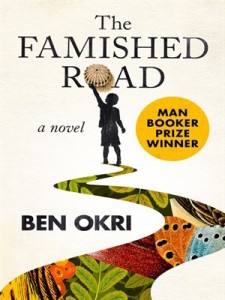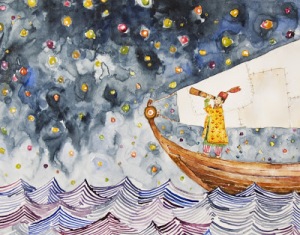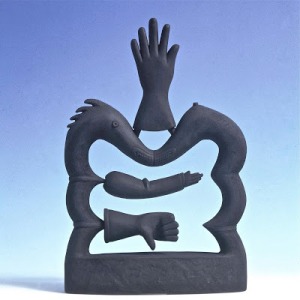
This novel, first published 1991, won Ben Okri the Man Booker Prize for Fiction. You might wonder what relevance a 1991 novel has today. Being a Booker Prize winner, it is still important, but is it still good? Does it still have meaning in today’s world, and, moreover, will there still be any connection with today’s readers? The answer is yes. Why? Because it is still so different that it is not possible to pigeonhole it into a genre, and because its subject is both depressing and relevant; desperately poor Nigerians living in a slum, with a spirit-being as a child. It is both astoundingly creative and deeply sobering.
A very real spirit world
In this novel Okri has created a “secondary world” consisting of a realistic slum and the “spirit world”. Okri’s secondary world is, as JRR Tolkien explained it, a “fictive, invented world with its own creatures, geography, history, people”, which requires coherence down to the finest detail and “great resources of inventiveness from its maker”.
Okri makes no distinction in the novel’s settings between the spirit world, which in the novel is as concrete as the real world, and the real world, which is a ghetto or shanty town in an unnamed African city, presumably somewhere in Nigeria (judging by the spelling of some words), and presumably Yoruban (again, judging by the spelling).
Descriptions of the spirit world, as lurid and fantastical as a surrealist painting or a psychedelic trip, are integrated seamlessly into the concrete world of “Azaro”, a “spirit child” or Abiku, and his utterly poverty-stricken parents. His name comes from “Lazarus”, risen from the dead.
Okri wrote a foreword to this, the 2016 e-book Kindle edition that has just (25th October 2016) been published by Open Road Integrated Media.
“All things to do with spirit compel art beyond the rim of possibilities. The visible must be used to invoke the invisible. This compels our art to go beyond itself and find a new language for impossibility.”
This is exactly what he has done – devised a new language. Doing so has made his novel famously unable to fit into any of the mainstream genres.
Real, relentless poverty
Okri’s descriptions of the slum where Azaro and his parents live are detailed and bare-faced, with no evasion or “vaseline on the lens”, and readers who have had direct experience of slum-living will recognize this factuality. This is poverty that means a life entirely without material resources. No electricity, no internet, no phone, no books, no furnishings, no house, no welfare system, no money – a hand-to-mouth existence. If you don’t work, you do not eat and you are in a never-ending cycle of poverty. If you can’t hawk what little you have, you do not eat. If you get hurt or get ill, you will probably die. You are but one step away from being a beggar with a nauseatingly stinky (not my choice of word, Okri’s) disease or disability.

“Constellations were visible in the sky, each star a different colour, luminous and pulsing.”
Okri makes the reader understand what true poverty is, and how ugly it is, and how crazy it makes people. This is a 1991 novel, but it is more true, and more apt today than it was then. Poverty, as Okri writes, does not change. The ghetto keeps its inhabitants in a cycle of despair. All that changes is the spirit, which provides the chance that people might escape the “famished road” as the title goes. Or perhaps, as migrants or refugees, escape the country altogether.
The sublimely beautiful spirit world
Contrasted with this suffering and relentless misery, the spirit world is depicted as a sublimely beautiful place, or state of being, with richness, delights and pleasures that are never-ending. But unlike “heaven” in other religions, to be reached after death, this spirit world is part of the living world, according to Animism and Shamanism practitioners in African countries, particularly central and west Africa. Humans turn into spirits, fight spirits and leave their bodies to go on fantastical, often nightmarish, spirit journeys, as much as spirit children do.

Spirit children choose to leave the spirit world by becoming human, and being, born, and may choose to “die” and return to the spirit world. Like elves and other fantasy creatures in fairy tales, spirit children are “lent” to humans for a limited time and may, like “snow children” melting or mermaid princesses returning to the sea, return to the spirit world when their sly and tempting fellow spirits charm them back.
The attachment between spirit children and their parents
Why should a spirit child want to leave the paradisiacal world to exist, often painfully, in the real world? For love, apparently.
“It may also have been that I [Azaro] wanted to taste of this world, to feel it, suffer it, know it, to love it, to make a valuable contribution to it, and to have that sublime mood of eternity in me as I live the life to come. But I sometimes think it was a face that made me want to stay. I wanted to make happy the bruised face of the woman who would become my mother.”
Also, this spirit child wanted to experience all the options open to people.
“All the roads multiplied, reproducing themselves, subdividing themselves, turning in on themselves, like snakes, tails in their mouths, twisting themselves into labyrinths. The road was the worst hallucination of them all, leading towards home and then away from it, without end, with too many signs, and no directions. The road became my torment, my aimless pilgrimage, and I found myself merely walking to discover where all the roads lead to, where they end.”
In turn, what stops the spirit child returning to the spirit world, or dying, is the love and “frailty” and “powerlessness” of his parents. After Azaro was beaten by his father for wandering around the forest and causing them an expense by breaking a window, Azaro decides not to eat. In desperation, his father addresses his starving (sulking) son:
“My son, my only son, your mother has never ceased being a young woman rich with hopes, and me a young man. We are poor. We have little to give you, but our love. You came out of our deepest joy. We prayed for you. We wanted you. And when you were born you had a mysterious smile on your face. The years passed and we watched the smile grow smaller, but its mystery remains. Don’t you feel for us? Every moment that my head is bursting with loads at the garage, my soul is brimming with good dreams for you. In this life you have seen how sweet even sorrow can be. Our life appears to be a sad music. So how can you come and then leave us? Do you know our misery? Do you know how you make even that bearable?”
Reaction to the spirit world Okri created
Okri’s novel is hard going, every page of it, and all eight sub-books within the 519 pages (or 8,888 pages in my ebook format). Unlike reading Science Fiction or Fantasy, where you know you are dealing with something that is not real, his world is concrete, real and pretty much as things are in Nigeria amongst the poorest of the poor. And it is unrelenting, page after page of incredibly convoluted, startling and almost inconceivable imagery. Well, conceivable only to him, since he put words to the riddles: “Anything is possible, one way or another. There are many riddles amongst us that neither the living nor the dead can answer.”
Reading the eight-thousand-plus ebook pages of this is like running a mental marathon. Occasionally I gave up trying to find meaning in the metaphors and themes and just let it all run through my head like cooking oil. (Many readers have found his prose both inspirational as art, and plain exhausting.) At times the descriptions of the family’s one-room shack with the central table, basin, hard bed and line for a few rags; and the flies, mosquitos, worms, rats and spiders, and the diabolical heat, torrential rains, beatings and hunger, seemed a welcome relief from the relentless torrent of unreality. Again, unreality only for those who don’t believe. For those that do, this might be no more than a description of the lives of people in their neighbourhood ghetto.
The “famished road”
A recurring theme, amongst the very many, is that of the road – or many roads. The title refers to the myth that Azaro’s father tells him about the “King of the Road”, who was always famished:
“‘He ate the trees, the bushes, the rocks, the sand, and he even tried to eat the earth. Then the strangest thing happened. He began to eat himself. He ate his legs, and his hands, and his shoulders, and his back, and his neck, and he ate his head. He ate himself till only his stomach remained…What had happened was that the King of the Road had become part of all the roads in this world. He is still hungry, and he will always be hungry…Some say people make sacrifices to the road to remember that the monster is still there and that he can rise at any time and start to eat up human beings again. Others say that it is a form of prayer that his type should never come back again to terrify our lives.’”
The road, and travelling the road to find the end of it, is a metaphor for never-ending hunger, and trying to find the end of hunger. One thing is constant in Azaro’s world, in Okri’s Nigeria –hunger, the search for food, the preparation of food and the need for food, day by day.
A masked first person narrator and a lack of plot
In his foreword, Okri refers to the spirit child as a “living myth”, a contradiction in terms, but nevertheless something that exists in Nigerian and other African cultures:
“I believed then that all cultures have a place or myth in which all their secret truths resonate. I believed that there are not many of these fulcrum points in a culture, but they have a secret relationship with all the other points, and if you touched one in the right way you could touch everything, life, death, and all in between. The spirit child was one such node. The thing was how to give it life; how to make it live. It had to be a story, it had to be natural; it had to live and it could not live without the right tone. Many things have to come together for this life to live. But for it to live was all. The rest would follow.”
The first person narrator, Azaro, the node of the story, is a child but is also quasi-omniscient. He is so omniscient that he can enter his parents’ dreams, read their minds, read others’ minds, inhabit animals, and travel through time and space – but he cannot see and understand everything, nor can he penetrate the mind of all beings. However, “First-person quasi-omniscient is at least as anomalous a class of narration as masked first-person, and that ‘quasi’ presents a few problems…. Establishing a narrator’s authority requires that his limitations be established too.” (Adam Mars-Jones, In the Body Bag, LRB, 6 Oct. 2016).
In this instance, it is very difficult to establish, to believe or disbelieve, the limitations of Azaro, the masked first-person, or his co-spirit child, Ade. Thus, it is also difficult to expect any development in the narrative. You don’t know what can happen because anything can happen.
This leads the novel to have no or little plot. Basically: Azaro is born, his parents get kicked out of their one room shack into another one-room shack. His mother hawks small goods for a living. His father carries heavy loads as a laborer. He sometimes goes to school. He hangs around the bar of “Madame Koto”, the proprietress of a local bar. His father goes a bit crazy and wants to be a boxer (and then a politician) and is beaten half to death. His mother gets more and more worn down and thin. The forest becomes towns, and roads, and eventually the bar gets electricity, and a gramophone, and Madame Koto gets a car. Political parties come and go. The poverty and violence remain. The family just cannot get a break. The boy grows no older. Three days seem like years, centuries like moments.
In this novel, eternity seems to have been captured in moments and Okri describes things both ancient and new: electricity, but also an old-style gramophone with a big horn; trucks and electric megaphones but also “dane guns”, long-barreled flintlock muskets imported into West Africa by Danish traders prior to the mid-19th century; “agbadas” and “ogogoro” (home-brewed alcohol now banned in Nigeria) but also French suits and commercial beer; adult illiteracy but also school lessons about “Mungo Park and the British Empire”. (Mungo Park, 11 September 1771 – 1806, was a Scottish explorer of West Africa, so if he was in the school’s history books that must be well after the 1800s.) But in this case, the plot does not matter.
What matters is the slow, gradual, very subtle meanderings towards finding the end of the road of famine, misery and hunger, the road which leads nowhere and never ends – except through dreams, through the spirit-world.
Conclusion: Still relevant
Looking back, Okri writes:
“Time, that decays everything else, gives literature a strange new life. As we diminish in time, works of literature grow. I hope that time has been kind to The Famished Road. Written with both hunger and repletion, may it find new life in this anniversary edition.”
The Famished Road has certainly grown in my estimation. Though hard to read, it is still impressive and surprisingly relevant. Go read it or put on your List of Important Novels to Read Before You Die.
About the author
Ben Okri, OBE (Officer of the Most Excellent Order of the British Empire), FRSL (Fellow of the Royal Society of Literature), born 15 March 1959, is a Nigerian-born poet and novelist. Okri is considered one of the foremost African authors in the post-modern and post-colonial traditions. He has more awards and honours than you can shake a stick at. His most recent novel is The Age of Magic (London: Head of Zeus, 2014). His Wikipedia entry is here. Neither his Facebook page, nor his MySpace page, nor his Twitter page are up to date (last entries around 2012) or particularly informative. I guess he is too busy writing and being very famous to do the social media stuff.

TECHNICAL QUESTIONS ON THE E-BOOK VERSION:
I asked the editorial team of Open Road Media (ORM) these questions, picked up while I was reading The Famished Road. Their answers are included. Just shows you what a professional editing team is all about.
QUESTION 1
I will feed their brains to the wind!’ he shouted.” – Is there a single quotation mark missing at the start of this sentence?
ORM RESPONSE: We’ll redistribute the file tonight with the missing quote added.
QUESTION 2
‘Sit down! Sit down and attract customers! Draw them here!’ I would sit and swot flies. The palm-wine everywhere made the flies… – Not sure if this should be “swat” not “swot”. Okri also uses “swot” elsewhere. I don’t think this is due to a particular character’s voice. Could just be a typo. Is it?
ORM RESPONSE: The use of “swot” is intentional. One of the British definitions is “to grind”: http://www.merriam-webster.com/dictionary/swot
QUESTION 3
‘What is Kokoro?’ I asked. ‘They are the ants that feed off the beans.’ ‘Ants?’ ‘Yes. They are good for you. They make you brilliant and help you grow up fast.’ – I’ve read that Kokoro is ‘made from a paste of maize flour mixed with sugar and gari (cassava) or yam flour and deep-fried’ in Nigeria. Not sure what Okri meant. Was the character pulling Azaro’s leg? Or is there genuinely a type of Kokoro made from fried ants?
ORM RESPONSE:
The Kokoro/ants passage is also correct. “Kokoro” is a Yoruba word with multiple meanings.
http://www.nairaland.com/186908/yoruba-words-several-meanings/6
https://en.wikipedia.org/wiki/Kokoro_(Yoruba)
QUESTION 4
Dad drank what seemed like a gallon of water. Then he wore his only pair of socks, which were full of holes; he wore his smelling boots, and began to pace up and down, his fearful energies swirling about him, disturbing the invisible residents of the room. – “Smelling” boots? Should that not be “smelly”? Is the word intentional – Ghanaian English?
ORM RESPONSE:
The use of “smelling” is intentional.